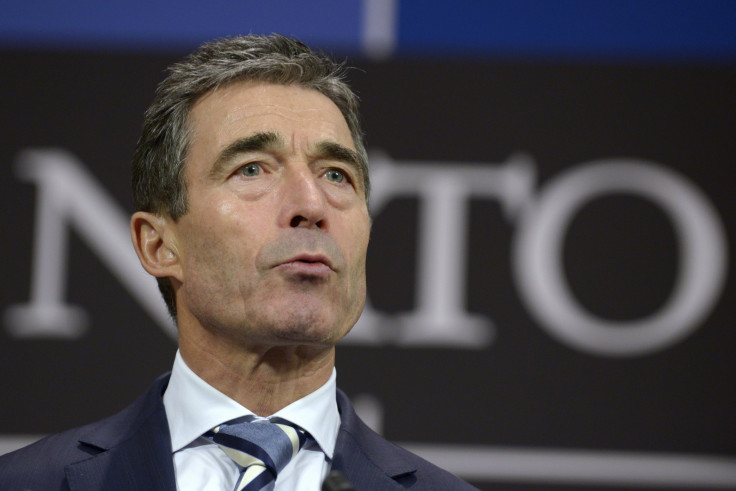US Asks Europe To Spend More Money For Defense, But It's Not Going To Happen

When Robert Gates gave his last policy speech as U.S. secretary of defense, he warned European NATO allies of the "dim and dismal" future the alliance faces if members continue to slash defense budgets and capabilities. That was in June 2011 in Brussels. Gates could not foresee that a little more than two and a half years later, the Western alliance would be sorely tested by the resurgence of its old foe, Russia -- and that those slashed defense budgets would hamper NATO’s ability to respond.
Gates’ warning is starting to sink in as post-Soviet Russia threatens the peace and security of Europe. Now, the U.S. again is calling on NATO’s European members to increase military spending. But the Europeans, still reeling from the 2008 financial crisis, just do not have the money to do that. Economic and foreign policy experts say they will keep spending, in percentage, far less than the U.S. on their militaries.
From 1990 to 1994, as the Soviet Union collapsed, the European members of NATO spent an average of 2.7 percent of their gross domestic product on defense. Last year, that percentage had dropped to 1.6 percent, compared to 4.4 percent in the U.S.
“The reason is political,” Rem Korteweg, a senior fellow at the Centre for European Reform, a London-based think tank, said in a phone interview. “They would need to cut back either on social welfare spending or their austerity program if they decide to increase defense spending,” he said, adding that the financial recovery of European countries is still very fragile.
Even before Gates’ speech, the U.S. had called for a long time on its European allies to increase military spending. NATO in fact agreed years ago that its members should spend 2 percent of GDP on defense, but today’s Europe has reorganized its budget priorities, and defense is not one of them. Among NATO’s biggest European nations only France and Great Britain, at 2.3 and 2.5 percent, respectively, meet the target.
But now, as tens of thousands of Russian troops sit near Ukraine’s eastern border and threaten military action, after Russia occupied and annexed Ukraine’s autonomous region of Crimea, Europe may be changing its tune.
“I think that it [the call to increase defense spending] is more realistic now than it has ever been,” said Samuel Charap, a senior fellow for Russia and Eurasia at the International Institute for Strategic Studies. “There are hard choices that have to be made, but I don’t think it is impossible.”
In 2011, European allies also had a hard choice to make: whether or not to join the campaign to remove the despotic Libyan ruler Moammar Gadhafi. John R. Deni, a research professor at the Strategic Studies Institute, said that while most of NATO Europe’s operational capabilities were deployed in Afghanistan, many governments were still “willing to reprioritize and reallocate” their forces, because they believed that their vital interests were at stake.
While France and England shared much of the burden at the beginning of the campaign, which lasted seven months, the U.S. still contributed a significant portion, which was instrumental for the campaign to continue. The operation, while ultimately successful and conducted without allied casualties, exposed inefficiency and dysfunction within NATO when dealing with new threats.
“Frankly, many of those allies sitting on the sidelines do so not because they do not want to participate, but simply because they can’t,” Gates said in his 2011 speech. “The military capabilities simply aren’t there.”
So while NATO officials said Russia may invade Ukraine "any day now," Korteweg believes the threat won't push governments to change their budgets in the short term, especially not in the 2014 fiscal year. “If you, for instance, decide to increase defense spending today, the impact will only let itself be felt in four or seven years down the line, so when dealing with the current Ukraine crisis, it won’t matter,” Korteweg said.
Korteweg’s point raises a contentious issue with many NATO experts, who believe that increasing defense spending to 2 percent of GDP average is not a sufficient metric to measure the effectiveness of a country’s military capabilities.
The Pentagon itself acknowledges as much. “The relevant challenge for us today (…) is no longer the total level of defense spending by allies but how these limited and dwindling resources are allocated and for what priorities,” Gates said.
For example, Greece spends 2.4 percent of GDP on defense, but contributes relatively little to the alliance. In contrast, Denmark’s military capability is one of the most valued in NATO, but the country only spends 1.4 percent on defense.
“They [Denmark] are really contributing, sharing burdens and risk, but they are not spending 2 percent,” Deni said. “They take on incredible risk and do the hard missions and they have been incredibly active in Afghanistan.” In fact, the Danes have one of the highest casualty rates in Afghanistan on a per-capita basis.
Deni, like many other experts, believes that the solution is not just to spend more now. Member nations, he said, need to share the burden by pooling military assets, boosting combat capabilities and improving logistics to field forces that could be deployable and sustainable.
“The 2 percent measure is necessary but not sufficient,” Deni said. “It is an important metric, but it can’t be the only one, because it doesn’t give us the full picture.”
© Copyright IBTimes 2024. All rights reserved.






















